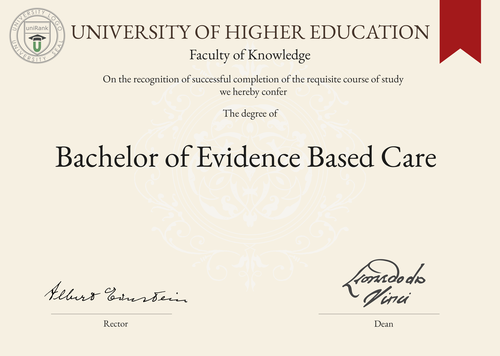
Bachelor of Evidence Based Care (BEBC)
Guide to Bachelor of Evidence Based Care Program/Course/Degree
Bachelor of Evidence Based Care (BEBC)

Program Name:
Bachelor of Evidence Based CareProgram or Degree abbreviation:
BEBCDuration range:
Varies by country and universityTuition range:
Varies by country and universityOverview:
The Bachelor of Evidence Based Care program is designed to provide students with a comprehensive understanding of evidence-based practices in healthcare. This program equips students with the necessary skills and knowledge to critically analyze research, apply evidence-based interventions and improve patient outcomes.Curriculum Overview by year:
The curriculum of the Bachelor of Evidence Based Care program is structured to cover a wide range of topics related to evidence-based care. The program typically includes courses such as Introduction to Evidence-Based Practice, Research Methods in Healthcare, Statistics for Evidence-Based Practice, Clinical Decision Making and Advanced Evidence Synthesis.Key Components:
- Introduction to Evidence-Based Practice - Research Methods in Healthcare - Statistics for Evidence-Based Practice - Clinical Decision Making - Advanced Evidence SynthesisCareer Prospects:
Graduates of the Bachelor of Evidence Based Care program can pursue various career paths in healthcare. They can work as evidence-based practice coordinators, research analysts, quality improvement specialists, or healthcare consultants. They may find employment in hospitals, research institutions, government agencies, or healthcare organizations.Salary Expectations:
The salary expectations for graduates of the Bachelor of Evidence Based Care program can vary depending on factors such as location, experience and job role. On average, professionals in this field can earn a competitive salary, with the potential for growth and advancement. For a more accurate understanding of salary expectations, you can utilize the Job Sites Search Engine, from our sister site jobRank, which searches over 4,600 job sites worldwide. Make sure to specify not only the job title but also the country you are interested in.Conclusions:
It is important to note that the duration, tuition fees, curriculum, key components, career prospects and salary expectations of the Bachelor of Evidence Based Care program can vary based on the chosen country or location of study, as well as the chosen university. Prospective students are encouraged to research and compare different universities and countries to find the best fit for their educational and career goals. Visitors interested in pursuing a Bachelor of Evidence Based Care degree can use the uniRank World Universities Search Engine to search for universities offering this specific degree anywhere in the world. This search engine provides a comprehensive database of universities and their programs, allowing individuals to find the most suitable options for their academic journey.World Universities Search Engine
search for Bachelor of Evidence Based Care (BEBC) and add the Location (country, state etc.) or specific University you are interested in studying at.
Query examples:
- Bachelor of Evidence Based Care (BEBC) United States
- Bachelor of Evidence Based Care (BEBC) United Kingdom online
- Bachelor of Evidence Based Care (BEBC) Australia international students
- Bachelor of Evidence Based Care (BEBC) University of California
- Bachelor of Evidence Based Care (BEBC) University of London tuition fees
- Bachelor of Evidence Based Care (BEBC) University of Sydney scholarships
Share Program/Course
Interesting? Share this program/course/degree info with your friends now.